For和since在现在完成时的应用
- 格式:ppt
- 大小:635.50 KB
- 文档页数:15
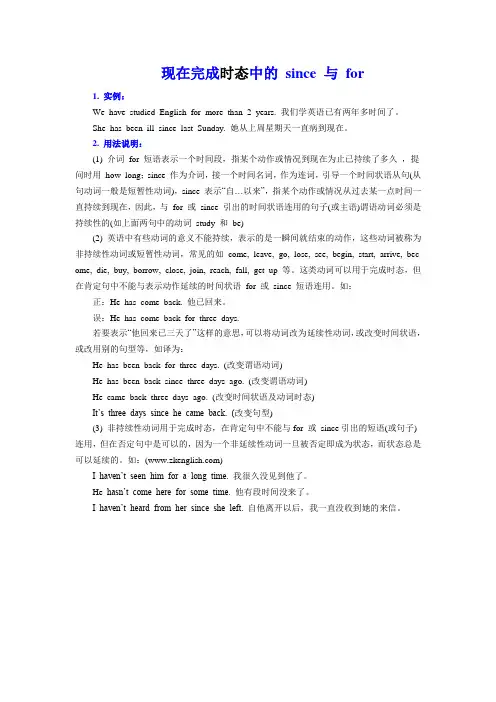
现在完成时态中的since 与for1. 实例:We have studied English for more than 2 years. 我们学英语已有两年多时间了。
She has been ill since last Sunday. 她从上周星期天一直病到现在。
2. 用法说明:(1) 介词for 短语表示一个时间段,指某个动作或情况到现在为止已持续了多久,提问时用how long;since 作为介词,接一个时间名词,作为连词,引导一个时间状语从句(从句动词一般是短暂性动词),since 表示“自…以来”,指某个动作或情况从过去某一点时间一直持续到现在,因此,与for 或since 引出的时间状语连用的句子(或主语)谓语动词必须是持续性的(如上面两句中的动词study 和be)(2) 英语中有些动词的意义不能持续,表示的是一瞬间就结束的动作,这些动词被称为非持续性动词或短暂性动词,常见的如come, leave, go, lose, see, begin, start, arrive, bec ome, die, buy, borrow, close, join, reach, fall, get up 等。
这类动词可以用于完成时态,但在肯定句中不能与表示动作延续的时间状语for 或since 短语连用。
如:正:He has come back. 他已回来。
误:He has come back for three days.若要表示“他回来已三天了”这样的意思,可以将动词改为延续性动词,或改变时间状语,或改用别的句型等,如译为:He has been back for three days. (改变谓语动词)He has been back since three days ago. (改变谓语动词)He came back three days ago. (改变时间状语及动词时态)It’s three days since he came back. (改变句型)(3) 非持续性动词用于完成时态,在肯定句中不能与for 或since引出的短语(或句子)连用,但在否定句中是可以的,因为一个非延续性动词一旦被否定即成为状态,而状态总是可以延续的。
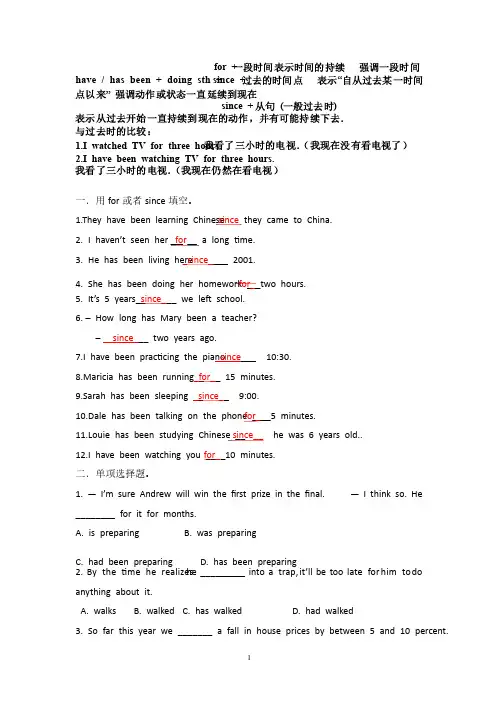
for +一段时间表示时间的持续 强调一段时间 have / has been + doing sth + since +过去的时间点 表示“自从过去某一时间 点以来” 强调动作或状态一直延续到现在 since + 从句 (一般过去时) 表示从过去开始一直持续到现在的动作,并有可能持续下去.与过去时的比较:1.I watched TV for three hours.我看了三小时的电视.(我现在没有看电视了)2.I have been watching TV for three hours. 我看了三小时的电视.(我现在仍然在看电视)一.用for 或者since 填空。
填空。
1.They have been learning Chinese since they came to China. 2. I haven’t seen her ___for __ a long me. 3. He has been living here _since____ 2001. 4. She has been doing her homework __for__two hours. 5. It’s 5 years __since___ we le school. 6. – How long has Mary been a teacher? – __since___ two years ago. 7.I have been prac cing the piano _since ___ 10:30. 8.Maricia has been running __for__ 15 minutes. 9.Sarah has been sleeping ___since__ 9:00. 10.Dale has been talking on the phone __for___5 minutes. 11.Louie has been studying Chinese __since__ he was 6 years old.. 12.I have been watching you __for__10 minutes. 二.单项选择题。
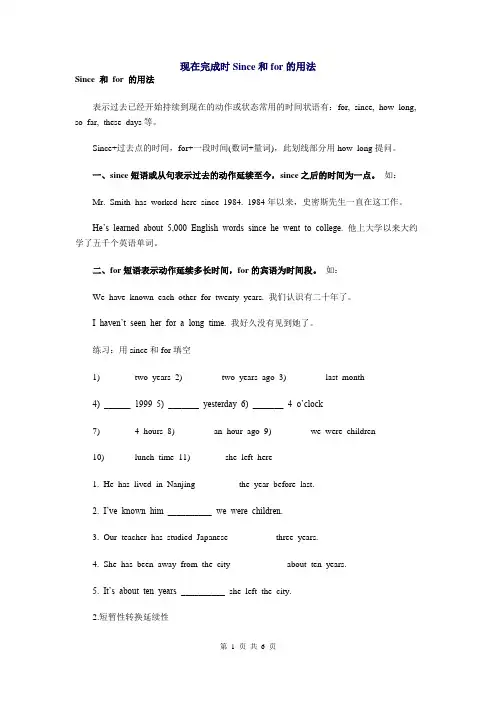
现在完成时Since和for的用法Since 和for 的用法表示过去已经开始持续到现在的动作或状态常用的时间状语有:for, since, how long, so far, these days等。
Since+过去点的时间,for+一段时间(数词+量词),此划线部分用how long提问。
一、since短语或从句表示过去的动作延续至今,since之后的时间为一点。
如:Mr. Smith has worked here since 1984. 1984年以来,史密斯先生一直在这工作。
He’s learned about 5,000 English words since he went to college. 他上大学以来大约学了五千个英语单词。
二、for短语表示动作延续多长时间,for的宾语为时间段。
如:We have known each other for twenty years. 我们认识有二十年了。
I haven’t seen her for a long time. 我好久没有见到她了。
练习:用since和for填空1) ______ two years 2) _______ two years ago 3) _______ last month4) ______ 1999 5) _______ yesterday 6) _______ 4 o’clock7) ______ 4 hours 8) _______ an hour ago 9) _______ we were children10) _____ lunch time 11) ______ she left here1. He has lived in Nanjing ________ the year before last.2. I’ve known him __________ we were children.3. Our teacher has studied Japanese _________ three years.4. She has been away from the city ___________ about ten years.5. It’s about ten years __________she left the city.2.短暂性转换延续性①arrive at/in sw. get to/reach sw. come/go/move to sw.→ be in sw./at school/at home/on the farm/be here/be there1) He got to Beijing five minutes ago.He ________ _________ _________ Beijing for _________ _________.2) I moved to the USA last year.I ________ ________ __________ the USA since __________ __________.3) I went home yesterday.I _______ ________ _________ home for _________ __________.4) They came here last week.They _________ _________ here since _________ __________.②come/go back, return → be back come/go out → be out1) He came out two years ago.He _________ __________ _________ for __________ __________.2) We return to Fuzhou yesterday.We ________ ________ _________ to Fuzhou since __________.③become → be1) I became a teacher in 2000.I ________ __________ a teacher for _________ _________.2) The river became dirty last year.The river _________ _________ dirty for _________ __________.④close → be closed open → be open1) The shop closed two hours ago.The shop ________ _________ _________ for _________ _________.2) The door opened at six in the morning.The door ________ ________ ________ for six hours.⑤get up → be up die → be deadleave sw. → be away from sw.fall asleep/get tot sleep → be asleepfinish/end → be over marry → be married1) I got up two hours ago.I ________ ________ ________ since ________ ________.2) He left Fuzhou just now.He _______ ________ ________ _________ Fuzhou for five minutes.3) My grandpa died in 2002.My grandpa _______ _______ ________for _______ ________.4) The meeting finished at six.The meeting ________ ______ ______ for six hours.5) I got to sleep two hours ago.I ________ _________ _________ since _________ __________.6) They married in 1990.They ________ _________ __________since _________.⑥start/begin to do sth. → do sth. begin → be on1) I began to teach at this school in 1995.I ____ ____ at this school since ____.2) The film began two minutes ago.The film ____ ____ ____ for ____ ____.⑦borrow → keep lose → not have buy → have put on → wearcatch/get a cold → have a cold get to know → know1) They borrowed it last week.They _________ _________ it since __________ __________.2) I bought a pen two hours ago.I _________ _________ a pen for ________ __________.3) I got to know him last year.I _________ __________ him since __________ __________.4) I put on my glasses three years ago.I __________ __________ my glasses for _________ _________.⑧have/has gone to → have been in1) He has gone to Beijing.He ____ ____ _____ Beijing for two days.⑨join the league/the Party/the army→ be a league/a Party member/a soldier→ be a membe r of the league/the Party→ be in the league/the Party/the army1) He joined the league in 2002.He ________ _________ a _________ _________ for two years.He ________ __________ a __________ ___________ the __________ for two years.He ____________ ___________ ___________ the league for two years.2) My brother joined the army two years ago.My brother __________ __________ a ___________ for ___________ ___________. My brother ___________ ___________ in ____________ ___________ for two years.3.汉译英1)这本字典我已买了三年了。
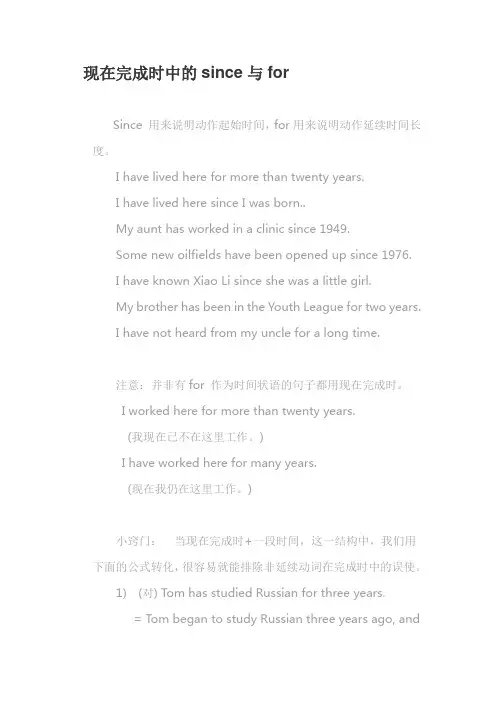
现在完成时中的since与forSince 用来说明动作起始时间,for用来说明动作延续时间长度。
I have lived here for more than twenty years.I have lived here since I was born..My aunt has worked in a clinic since 1949.Some new oilfields have been opened up since 1976.I have known Xiao Li since she was a little girl.My brother has been in the Youth League for two years.I have not heard from my uncle for a long time.注意:并非有for 作为时间状语的句子都用现在完成时。
I worked here for more than twenty years.(我现在已不在这里工作。
)I have worked here for many years.(现在我仍在这里工作。
)小窍门:当现在完成时+一段时间,这一结构中,我们用下面的公式转化,很容易就能排除非延续动词在完成时中的误使。
1)(对) Tom has studied Russian for three years.= Tom began to study Russian three years ago, and is still studying it now.2)(错) Harry has got married for six years.= Harry began to get married six years ago, and is still getting married now.显然,第二句不对,它应改为 Harry got married six years ago.或 Harry has been married for six years.。
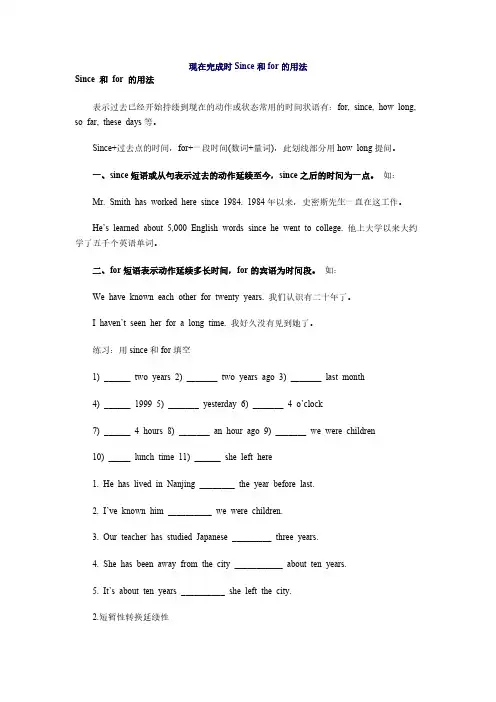
现在完成时Since和for的用法Since 和for 的用法 表示过去已经开始持续到现在的动作或状态常用的时间状语有:for, since, how long, so far, these days等。
Since+过去点的时间,for+一段时间(数词+量词),此划线部分用how long提问。
一、since短语或从句表示过去的动作延续至今,since之后的时间为一点。
如: Mr. Smith has worked here since 1984. 1984年以来,史密斯先生一直在这工作。
He’s learned about 5,000 English words since he went to college. 他上大学以来大约学了五千个英语单词。
二、for短语表示动作延续多长时间,for的宾语为时间段。
如: We have known each other for twenty years. 我们认识有二十年了。
I haven’t seen her for a long time. 我好久没有见到她了。
练习:用since和for填空 1) ______ two years 2) _______ two years ago 3) _______ last month 4) ______ 1999 5) _______ yesterday 6) _______ 4 o’clock 7) ______ 4 hours 8) _______ an hour ago 9) _______ we were children 10) _____ lunch time 11) ______ she left here 1. He has lived in Nanjing ________ the year before last. 2. I’ve known him __________ we were children. 3. Our teacher has studied Japanese _________ three years. 4. She has been away from the city ___________ about ten years. 5. It’s about ten years __________ she left the city. 2.短暂性转换延续性 ①arrive at/in sw. get to/reach sw. come/go/move to sw. →be in sw./at school/at home/on the farm/be here/be there 1) He got to Beijing five minutes ago. He ________ _________ _________ Beijing for _________ _________. 2) I moved to the USA last year. I ________ ________ __________ the USA since __________ __________. 3) I went home yesterday. I _______ ________ _________ home for _________ __________. 4) They came here last week. They _________ _________ here since _________ __________. ②come/go back, return →be back come/go out →be out 1) He came out two years ago. He _________ __________ _________ for __________ __________. 2) We return to Fuzhou yesterday. We ________ ________ _________ to Fuzhou since __________. ③become →be 1) I became a teacher in 2000. I ________ __________ a teacher for _________ _________. 2) The river became dirty last year. The river _________ _________ dirty for _________ __________. ④close →be closed open →be open 1) The shop closed two hours ago. The shop ________ _________ _________ for _________ _________. 2) The door opened at six in the morning. The door ________ ________ ________ for six hours. ⑤get up →be up die →be dead leave sw. →be away from sw. fall asleep/get tot sleep →be asleep finish/end →be over marry →be married 1) I got up two hours ago. I ________ ________ ________ since ________ ________. 2) He left Fuzhou just now. He _______ ________ ________ _________ Fuzhou for five minutes. 3) My grandpa died in 2002. My grandpa _______ _______ ________for _______ ________. 4) The meeting finished at six. The meeting ________ ______ ______ for six hours. 5) I got to sleep two hours ago. I ________ _________ _________ since _________ __________. 6) They married in 1990. They ________ _________ __________since _________. ⑥start/begin to do sth. →do sth. begin →be on 1) I began to teach at this school in 1995. I ____ ____ at this school since ____. 2) The film began two minutes ago. The film ____ ____ ____ for ____ ____. ⑦borrow →keep lose →not have buy →have put on →wear catch/get a cold →have a cold get to know →know 1) They borrowed it last week. They _________ _________ it since __________ __________. 2) I bought a pen two hours ago. I _________ _________ a pen for ________ __________. 3) I got to know him last year. I _________ __________ him since __________ __________. 4) I put on my glasses three years ago. I __________ __________ my glasses for _________ _________. ⑧have/has gone to →have been in 1) He has gone to Beijing. He ____ ____ _____ Beijing for two days. ⑨join the league/the Party/the army →be a league/a Party member/a soldier →be a member of the league/the Party →be in the league/the Party/the army 1) He joined the league in 2002. He ________ _________ a _________ _________ for two years. He ________ __________ a __________ ___________ the __________ for two years. He ____________ ___________ ___________ the league for two years. 2) My brother joined the army two years ago. My brother __________ __________ a ___________ for ___________ ___________. My brother ___________ ___________ in ____________ ___________ for two years. 3.汉译英 1)这本字典我已买了三年了。
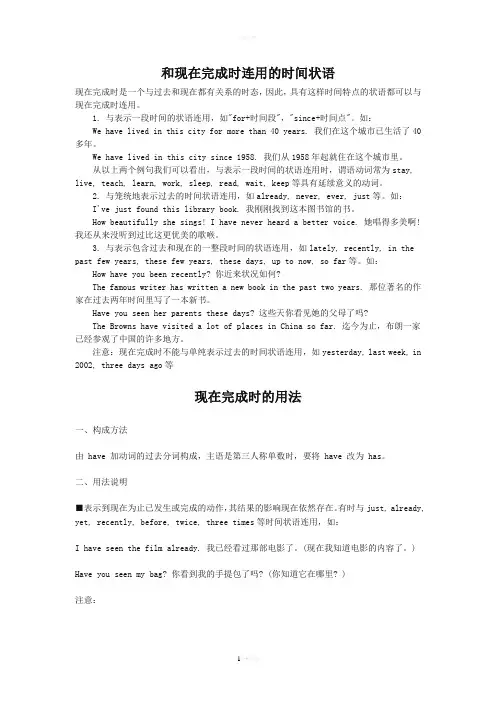
和现在完成时连用的时间状语现在完成时是一个与过去和现在都有关系的时态,因此,具有这样时间特点的状语都可以与现在完成时连用。
1. 与表示一段时间的状语连用,如"for+时间段","since+时间点"。
如:We have lived in this city for more than 40 years. 我们在这个城市已生活了40多年。
We have lived in this city since 1958. 我们从1958年起就住在这个城市里。
从以上两个例句我们可以看出,与表示一段时间的状语连用时,谓语动词常为stay, live, teach, learn, work, sleep, read, wait, keep等具有延续意义的动词。
2. 与笼统地表示过去的时间状语连用,如already, never, ever, just等。
如:I've just found this library book. 我刚刚找到这本图书馆的书。
How beautifully she sings! I have never heard a better voice. 她唱得多美啊!我还从来没听到过比这更优美的歌喉。
3. 与表示包含过去和现在的一整段时间的状语连用,如lately, recently, in the past few years, these few years, these days, up to now, so far等。
如:How have you been recently? 你近来状况如何?The famous writer has written a new book in the past two years. 那位著名的作家在过去两年时间里写了一本新书。
Have you seen her parents these days? 这些天你看见她的父母了吗?The Browns have visited a lot of places in China so far. 迄今为止,布朗一家已经参观了中国的许多地方。
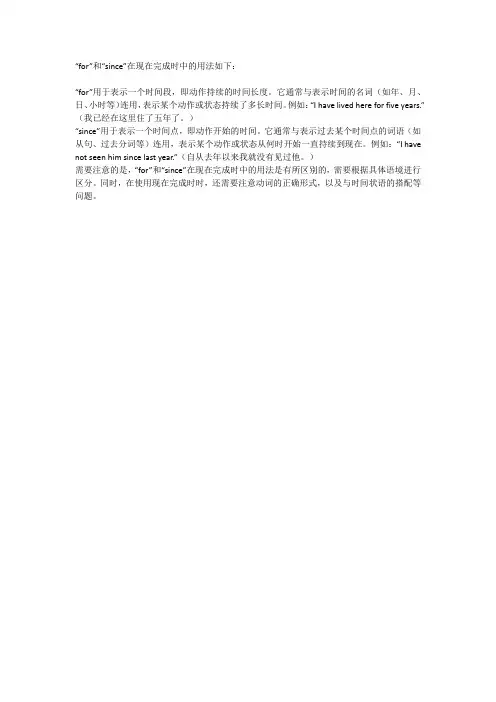
“for”和“since”在现在完成时中的用法如下:
“for”用于表示一个时间段,即动作持续的时间长度。
它通常与表示时间的名词(如年、月、日、小时等)连用,表示某个动作或状态持续了多长时间。
例如:“I have lived here for five years.”(我已经在这里住了五年了。
)
“since”用于表示一个时间点,即动作开始的时间。
它通常与表示过去某个时间点的词语(如从句、过去分词等)连用,表示某个动作或状态从何时开始一直持续到现在。
例如:“I have not seen him since last year.”(自从去年以来我就没有见过他。
)
需要注意的是,“for”和“since”在现在完成时中的用法是有所区别的,需要根据具体语境进行区分。
同时,在使用现在完成时时,还需要注意动词的正确形式,以及与时间状语的搭配等问题。
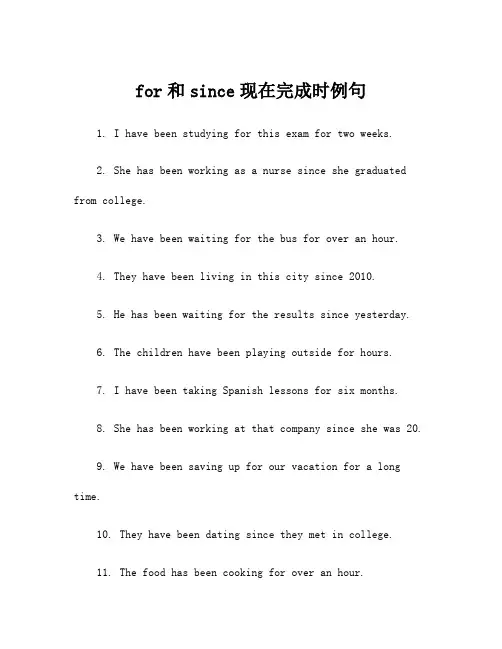
for和since现在完成时例句1. I have been studying for this exam for two weeks.2. She has been working as a nurse since she graduated from college.3. We have been waiting for the bus for over an hour.4. They have been living in this city since 2010.5. He has been waiting for the results since yesterday.6. The children have been playing outside for hours.7. I have been taking Spanish lessons for six months.8. She has been working at that company since she was 20.9. We have been saving up for our vacation for a long time.10. They have been dating since they met in college.11. The food has been cooking for over an hour.12. He has been driving for hours without a break.13. She has been feeling unwell since last week.14. They have been arguing for the past hour.15. I have been working on this project for months.16. We have been waiting for the concert to start for a while.17. The store has been closed for renovations since last month.18. He has been looking for his keys since this morning.19. She has been practicing the piano for years.20. They have been attending the same school since childhood.21. I have been saving up for a new car for a long time.22. She has been feeling tired for days.23. We have been living in this neighborhood since we got married.24. They have been planning the party for weeks.25. I have been studying English for a year.26. He has been searching for his lost dog since yesterday.27. She has been working on this project since last summer.28. They have been cooking dinner for the past hour.29. I have been waiting for my friend for over an hour.30. We have been shopping for new clothes for the trip.31. The sun has been shining for the past few days.32. She has been feeling unwell since last month.33. They have been talking for hours.34. I have been studying for my exams for weeks.35. He has been playing the guitar since he was a child.36. She has been working at the company for over a decade.37. They have been practicing for the upcoming performance.38. We have been waiting for the train for a long time.39. The rain has been falling for days.40. He has been traveling around the world since last year.41. She has been feeling better since she started her new medication.42. They have been dating for a few months.43. I have been working on this report for days.44. We have been saving up for a new house for years.45. He has been studying for his exams for weeks.46. She has been waiting for the bus since this morning.47. They have been living in the same house for years.48. I have been working at this company since I graduated.49. We have been thinking about our future for a while.50. The dog has been barking for hours.51. She has been feeling sick since last week.52. They have been playing basketball for the past hour.53. I have been writing in my journal for years.。
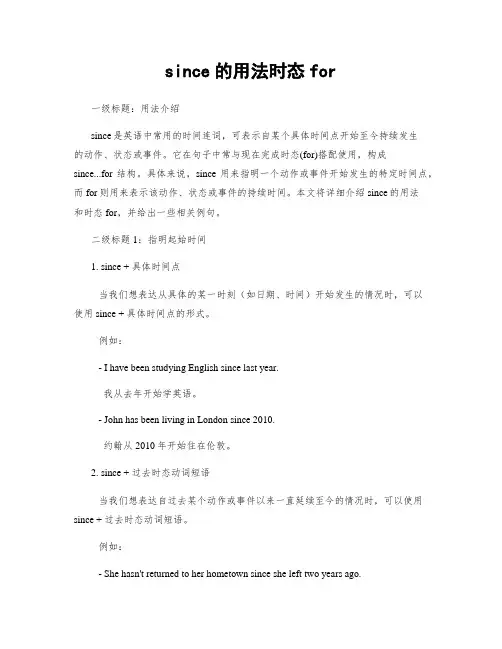
since的用法时态for一级标题:用法介绍since是英语中常用的时间连词,可表示自某个具体时间点开始至今持续发生的动作、状态或事件。
它在句子中常与现在完成时态(for)搭配使用,构成since...for结构。
具体来说,since用来指明一个动作或事件开始发生的特定时间点,而for则用来表示该动作、状态或事件的持续时间。
本文将详细介绍since的用法和时态for,并给出一些相关例句。
二级标题1:指明起始时间1. since + 具体时间点当我们想表达从具体的某一时刻(如日期、时间)开始发生的情况时,可以使用since + 具体时间点的形式。
例如:- I have been studying English since last year.我从去年开始学英语。
- John has been living in London since 2010.约翰从2010年开始住在伦敦。
2. since + 过去时态动词短语当我们想表达自过去某个动作或事件以来一直延续至今的情况时,可以使用since + 过去时态动词短语。
例如:- She hasn't returned to her hometown since she left two years ago.自两年前离开后,她就没有回过家乡。
- They have been good friends since they met in college.自从大学相识以来,他们一直是好朋友。
二级标题2:表示持续时间1. for + 时间段很多情况下我们需要表达一个动作或事件持续了多久,这时可以使用for + 时间段。
例如:- I have been working in this company for five years.我在这家公司工作已经五年了。
- We have lived in this city for a decade.我们在这个城市生活已经十年了。
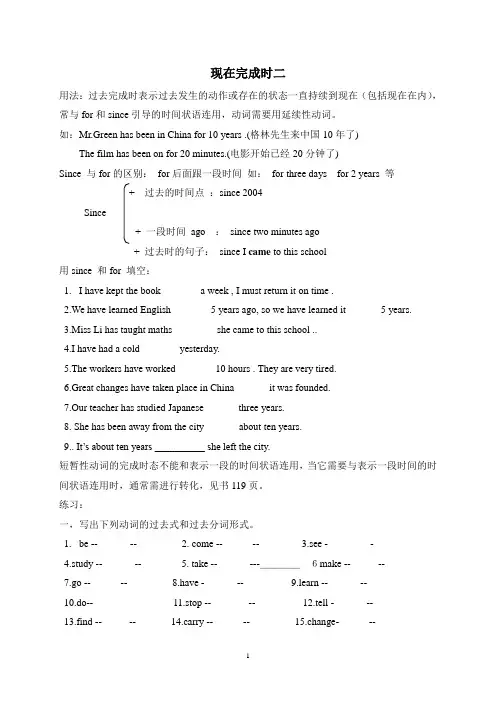
现在完成时二用法:过去完成时表示过去发生的动作或存在的状态一直持续到现在(包括现在在内),常与for和since引导的时间状语连用,动词需要用延续性动词。
如:Mr.Green has been in China for 10 years .(格林先生来中国10年了)The film has been on for 20 minutes.(电影开始已经20分钟了)Since 与for的区别:for后面跟一段时间如:for three days for 2 years 等+ 过去的时间点:since 2004Since+ 一段时间ago :since two minutes ago+ 过去时的句子:since I came to this school用since 和for 填空:1.I have kept the book _______ a week , I must return it on time .2.We have learned English _______ 5 years ago, so we have learned it ______ 5 years.3.Miss Li has taught maths ________ she came to this school ..4.I have had a cold _______ yesterday.5.The workers have worked _______ 10 hours . They are very tired.6.Great changes have taken place in China ______ it was founded.7.Our teacher has studied Japanese ______ three years.8. She has been away from the city ______ about ten years.9.. It’s about ten years __________ she left the city.短暂性动词的完成时态不能和表示一段的时间状语连用,当它需要与表示一段时间的时间状语连用时,通常需进行转化,见书119页。
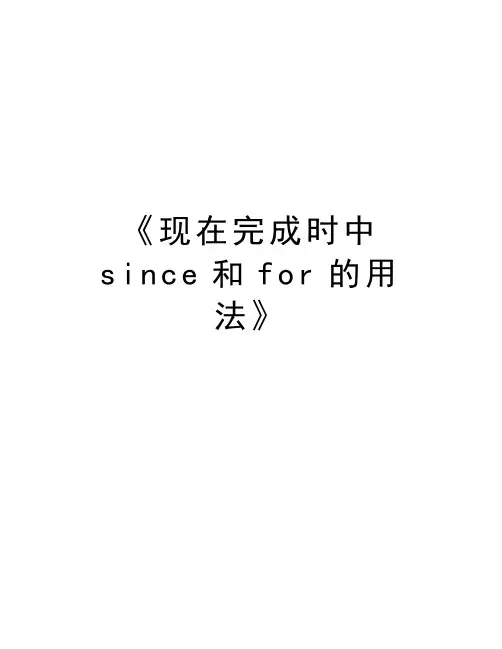
《现在完成时中s i n c e和f o r的用法》《现在完成时中since和for的用法》微课讲课稿一、引入新课同学们好,本节课我们主要学习现在完成时中since和for的用法二、学习for的用法首先,我们来看两个句子Number OneI came to this school last week. 我上周六到这所学校Number TwoI have been in the new school for a week. 我到这所新学校已经一周了我们来看一下,第一句中的last week用于一般过去时的句子,第二句中的for a week用于现在完成时的句子。
a week 是一个时间段,因此我们用“for+时间段”来表达一段时间。
那同学们看一下,如果我们把第一句话中的last week 改成last year,那么第二句话中的for a week该改成什么呢?对,应该变成for a year.三、学习since的用法接下来,我们再看两个句子Number OneLily left home last Friday. 丽丽上周五离开家Number TwoLily has been away from home since last Friday. 丽丽自从上周五已离开家我们来看一下,第一句中的last Friday是过去的一个时间点,因此这句话用一般过去时表达,而第二句中since last Friday 用在现在完成时的句子中,last Friday 是一个过去的时间点,因此我们用“since +时间点”来表达一段时间它有三个具体用法,我们来详细学习一下1、since+过去一个时间点,如具体的年月、星期、小时。
eg:1990、last night、half past six我们来看一个例句:I have been here since 1990. 我自1990年以来一直在这里1990是过去的一个时间点,since 1990, 就是since+过去一个时间点来表达一段时间的第一个用法2、since+一段时间+ago,表示“自···时间前开始至今”我们来看一个例句:He has been here since five years ago. 他在这儿已经有5年了five years 是一段时间,since后不能直接跟时间段,但后面再跟ago是可以的,因此since five years ago 就是since+时间段+ago来表达一段时间的第二个用法3、since+一般过去时从句我们来看两个例句Number OneMany things have changed since you left. 自从你走后许多事情发生了变化“you left”是一个一般过去时从句。
现在完成时中的for和since知识点复习:
八年级上册英语
(1)for + 一段时间(用How long提问)
We have known each other for ten years. 我们相识10年了。
(2)since + 句子/具体时间
since 引导的短语或从句用How long提问
①since+过去一个时间点(具体的年、月、日、钟点等)。
Tom has eaten nothing since yesterday.
②since + 一段时间+ago
We have been friends since five months ago. 从5个月前起,我们就成了朋友。
③since+从句,表示“自过去某个时间、某件事情以来”,从句时态:一般过去时。
I have lived here since I left Shanghai.
④It is+一段时间+since从句,表示“自从某件事发生已有一段时间了”。
It is two years since I left school.
通过对现在完成时中的for和since知识点复习:八
年级上册英语的学习,是否已经掌握了本文知识点,更多参考资料尽在!。
since for的用法时态一、since for的用法介绍Since和for是英语中常见的时间状语从句,用于描述一个事件或动作发生的时间或持续的时间段。
它们在使用时会根据特定的情境和语义需求来决定使用哪个。
1. since的用法Since通常用来表示一个事件或动作从过去某个具体时间点开始一直延续到现在。
它可以接完整的时间短语、具体日期、或者动词过去式等表达方式。
例如:- I have been studying English since last year.(我从去年开始一直在学习英语)- She has been living in London since she graduated from university.(她从大学毕业后就一直住在伦敦)2. for的用法For则表示一个事件或动作已经持续了多长时间,通常配合表示持续时间段的表达方式来使用,如年、月、周、天等。
例如:- He has been working at this company for five years.(他已经在这家公司工作五年了)- They have been dating for over a month.(他们已经约会了一个多月了)两者都是表示时间段,但是since强调起始点,for则强调持续的时间长度。
二、since and for 的区别与搭配1. 区别不同之处主要在于所指代的含义不同。
Since强调时间的起点,对于某个具体事件或时间点的回溯。
而for则侧重表示已经过了多长时间,持续的时长。
2. 搭配a. since的常见搭配- since + 具体时间短语/日期:表示从某个特定过去时间开始到现在所经过的时间段。
例如:- I have known him since we were kids.(我认识他自从我们还是孩子)- She has been working here since Monday.(自从星期一以来,她一直在这里工作)- since + 过去时/现在完成时动作:表示某个事件或状态从过去某个时间点开始并持续至今。
Since 和 for 都可用于完成时,而 ago 只能用于过去时,其中 since 后面连接的是一个时间点,可以是一个具体的年月日或事件,而 for 后面连接的是一个时间段,不一定是确定的时间,但必须是一段时间。
从词性和连接时间来看,since 可以是介词、连词或副词,而 for 只是介词,ago 是副词,因此答题的关键是从时态和词性出发。
一、用 since,for 或 ago 完成下列的句子1、Claire is in Poland now. She has been there _____ two weeks.2、Claire has been in Poland _____ May and she is still there.3、Claire went to Poland two weeks _____.4、Matthew is studying in his room. He has been studying _____ 8 am.5、Matthew has been studying in his room _____ five hours.6、Matthew went to his room to study five hours _____.7、I know Charlie. We got acquainted fifteen years _____.8、I have known Charlie _____ fifteen years and he is my best friend.9、Charlie is my best friend. We have known each other _____ we were ten.10、I read this book a week _____.11、This book is fascinating. I have been reading it _____ a week now.12、This book is fascinating. I have been reading it _____ last week.13、I haven’t spoken to Kate _____ 2020.14、I spoke to Kate two years _____.15、I haven’t spoken to Kate _____ ages and I miss her.二、答案及解析1、for解析:与现在完成时连用时,for 接的是一个时间段,since 接的是一个时间点或事件,所以选for。
现在完成时的持续型用法现在完成时还可表示过去某一时间开始并一直持续到现在(包括“现在”在内)的动作或状态,该用法中的动词多是延续性动词,常见的时态标志词有since和 for。
1. since意为“自从……以来”,它既可作介词,也可作连词。
作介词时,后接表示过去的时间点,表示某事开始的时间;作连词时,引导时间状语从句,从句常用一般过去时。
如:Mr. Miller has lived here since five years ago.(since+时间段+ago)I have had the dictionary since I was ten.(since+“一般过去时”)2. for作介词,后接一段时间,表示一个动作或一种状态已经持续了多长时间。
如:Miss Green has taught in the village for three years.Kate has been here for two hours.注意:1. 对since和 for引导的时间状语提问时,常用how long。
如:I have worked here for two years. (对划线部分提问)How long have you worked here?2. 在现在完成时中,含有for和since的句子可以相互转换。
如:Mary has been in Beijing for two days.(for+时间段)=Mary has been in Beijing since two days ago.(since+时间段+ago)3. 在现在完成时中,表示短暂意义的动词(如come和see)在肯定句和一般疑问句中不能和表示一段时间的时间状语连用,但在否定句中是可以的。
如:Bill has come here for an hour. (×)I haven’t seen Kate for three years. (√)4. It has been / It’s +时间段+since从句(一般过去时). 表示:“自从……以来,有多长时间了。
Since和for的用法及区别在英语学习中,since 和 for 是两个常见的用于表示时间的词,它们的用法既有相似之处,也有明显的区别。
理解和正确运用这两个词对于准确表达时间概念至关重要。
首先,让我们来看看 since 的用法。
Since 通常用作介词或连词,表示“自从以来”。
作为介词时,后面接一个具体的时间点,比如“since 2010”(自从 2010 年以来)、“since Monday”(自从周一以来)。
作为连词时,后面接一个从句,表示一个动作或事件的开始时间,例如“Since I came here, I have made many friends”(自从我来到这里,我交了很多朋友。
)需要注意的是,since 所引导的时间状语从句,其主句通常使用现在完成时,从句则使用一般过去时。
比如:“I have lived in this city since I was a child”(自从我还是个孩子的时候,我就住在这个城市。
)在这个句子中,“have lived”是现在完成时,“was”是一般过去时。
接下来,我们再了解一下 for 的用法。
For 用作介词,表示一段时间,其后通常接时间段,比如“for two years”(两年)、“for three hours”(三个小时)。
当我们使用 for 时,句子的时态通常也是现在完成时,但也可以根据具体语境使用其他时态。
例如:“He has studied English for five years”(他已经学习英语五年了。
)这里使用了现在完成时。
但也可以说:“I will stay here for a week”(我将在这里待一周。
)这是一般将来时。
那么,since 和 for 的区别到底在哪里呢?一个关键的区别在于,since 强调的是动作或情况从过去的某一个时间点开始,一直持续到现在,并且这个时间点是明确的。
而 for 强调的是动作或情况持续的时间段,不强调具体的起始时间点。